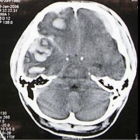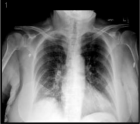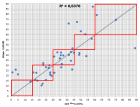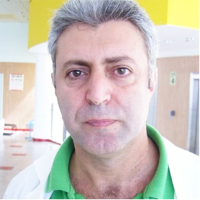Abstract
Case Report
Transcatheter arterial chemoembolization combined with molecular targeted therapy for a patient with hepatocellular carcinoma with intrahepatic metastasis and main portal vein tumor thrombus: A case report and literature review
Yu Zhong Wen, Shi Jie Dai, Su Fen Cheng, Jun Shi and Jun Hua Ai*
Published: 02 June, 2020 | Volume 4 - Issue 1 | Pages: 036-038
Hepatocellular carcinoma (HCC) is characterized by high morbidity, high recurrence, and high mortality rates. In China, the morbidity of HCC is fifth among all malignant tumors and HCC is the third most common cause of cancer-related deaths. Most HCC patients also have liver cirrhosis. Surgery is the sole curative method for HCC; however, many patients are diagnosed with HCC during its advanced stages so radical resection can no longer be performed. Therefore, the proportion of patients who undergo radical hepatectomy is less than 30%. Patients with mildly advanced HCC cannot undergo hepatectomy and thus transcatheter arterial chemoembolization (TACE) and/or biological targeted therapy are alternative options. However, data on the effects of TACE therapy or biological targeted therapy are limited. Therefore, an investigation of multimodal and individualized treatments is critical to ensure the best treatment. In June 2018, we treated an advanced HCC patient with multiple metastases and right portal vein tumor thrombus. The patient exhibited partial remission after undergoing treatment with TACE and crizotinib capsules for 1 month. The case and a literature review are reported here.
Read Full Article HTML DOI: 10.29328/journal.acgh.1001020 Cite this Article Read Full Article PDF
Keywords:
Hepatocellular carcinoma (HCC); Transcatheter arterial chemoembolization (TACE); Molecular targeted therapy; Individualized therapy
References
- Public Health and Family Planning Commission in the People's Republic of China. Specification for diagnosis and treatment of primary liver cancer. Chinese Journal of Practical Surgery. 2017; 37: 114-126.
- Luo J, Guo RP, Lai EC, Zhang YJ, Lau WY, et al. Transarterial chemoembolization for unresectable hepatocellular carcinoma with portal vein tumor thrombosis: a prospective comparative study. Ann Surg Oncol. 2011; 18: 413–420. PubMed: https://www.ncbi.nlm.nih.gov/pubmed/20839057
- Niu ZJ, Ma YL, Kang P, Ou SQ, Meng ZB, et al. Transarterial chemoembolization compared with conservative treatment for advanced hepatocellular carcinoma with portal vein tumor thrombus: using a new classification. Med Oncol. 2012; 29: 2992–2997. PubMed: https://www.ncbi.nlm.nih.gov/pubmed/22200992
- Sur BW, Sharma A. Transarterial Chemoembolization for Hepatocellular Carcinoma. J Radiol Nurs. 2018; 37: 107-111.
- Tian M, Zhang X, Huang G, Fan W, Li J, et al. Alpha-fetoprotein assessment for hepatocellular carcinoma after transarterial chemoembolization. Abdominal Radiology. 2019; 44: 3304-3311. PubMed: https://www.ncbi.nlm.nih.gov/pubmed/31250181
- Yuan J, Yin X, Tang B, Ma H, Zhang L, et al. Transarterial Chemoembolization(TACE) Combined with Sorafenib in Treatment of HBV Background Hepatocellular Carcinoma with Portal Vein Tumor Thrombus: A Propensity Score Matching Study. BioMed Res Int. 2019; 2019: 2141859. PubMed: https://www.ncbi.nlm.nih.gov/pmc/articles/PMC6699376/
- Park JW, Kim YJ, Kim DY, Bae SH, Paik SW, et al. Sorafenib With or Without Concurrent Transarterial Chemoembolization in Patients With Advanced Hepatocellular Carcinoma: The Phase III STAH Trial. J Hepatol. 2019; 70: 684-691. PubMed: https://pubmed.ncbi.nlm.nih.gov/30529387/
Figures:
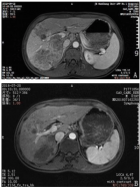
Figure 1
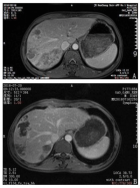
Figure 2
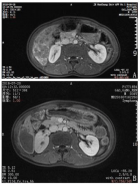
Figure 3
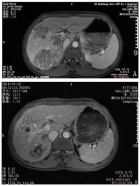
Figure 4
Similar Articles
-
Transcatheter arterial chemoembolization combined with molecular targeted therapy for a patient with hepatocellular carcinoma with intrahepatic metastasis and main portal vein tumor thrombus: A case report and literature reviewYu Zhong Wen,Shi Jie Dai,Su Fen Cheng,Jun Shi,Jun Hua Ai*. Transcatheter arterial chemoembolization combined with molecular targeted therapy for a patient with hepatocellular carcinoma with intrahepatic metastasis and main portal vein tumor thrombus: A case report and literature review. . 2020 doi: 10.29328/journal.acgh.1001020; 4: 036-038
-
Recurrent hydrothorax due to diaphragmatic perforation post hepatocellular carcinoma radiofrequency ablation: A case reportLaia Aceituno*,Alba Prió,Fernando L Ascanio, Xavier Serres-Créixams,Beatríz Mínguez,Joan Genescà,Lluís Castells,Ares A Villagrasa1. Recurrent hydrothorax due to diaphragmatic perforation post hepatocellular carcinoma radiofrequency ablation: A case report. . 2021 doi: 10.29328/journal.acgh.1001026; 5: 013-015
Recently Viewed
-
Clinical and Histopathological Mismatch: A Case Report of Acral FibromyxomaMonica Mishra*,Kailas Mulsange,Gunvanti Rathod,Deepthi Konda. Clinical and Histopathological Mismatch: A Case Report of Acral Fibromyxoma. Arch Pathol Clin Res. 2025: doi: 10.29328/journal.apcr.1001045; 9: 005-007
-
Unconventional powder method is a useful technique to determine the latent fingerprint impressionsHarshita Niranjan,Shweta Rai,Kapil Raikwar,Chanchal Kamle,Rakesh Mia*. Unconventional powder method is a useful technique to determine the latent fingerprint impressions. J Forensic Sci Res. 2022: doi: 10.29328/journal.jfsr.1001035; 6: 045-048
-
Doppler Evaluation of Renal Vessels in Pediatric Patients with Relapse and Remission in Different Categories of Nephrotic SyndromeAmit Nandan Dhar Dwivedi*, Srishti Sharma, OP Mishra, Girish Singh. Doppler Evaluation of Renal Vessels in Pediatric Patients with Relapse and Remission in Different Categories of Nephrotic Syndrome. J Clini Nephrol. 2023: doi: 10.29328/journal.jcn.1001112; 7: 067-072
-
Atlantoaxial subluxation in the pediatric patient: Case series and literature reviewCatherine A Mazzola*,Catherine Christie,Isabel A Snee,Hamail Iqbal. Atlantoaxial subluxation in the pediatric patient: Case series and literature review. J Neurosci Neurol Disord. 2020: doi: 10.29328/journal.jnnd.1001037; 4: 069-074
-
Intelligent Design of Ecological Furniture in Risk Areas based on Artificial SimulationTorres del Salto Rommy Adelfa*, Bryan Alfonso Colorado Pástor*. Intelligent Design of Ecological Furniture in Risk Areas based on Artificial Simulation. Arch Surg Clin Res. 2024: doi: 10.29328/journal.ascr.1001083; 8: 062-068
Most Viewed
-
Evaluation of Biostimulants Based on Recovered Protein Hydrolysates from Animal By-products as Plant Growth EnhancersH Pérez-Aguilar*, M Lacruz-Asaro, F Arán-Ais. Evaluation of Biostimulants Based on Recovered Protein Hydrolysates from Animal By-products as Plant Growth Enhancers. J Plant Sci Phytopathol. 2023 doi: 10.29328/journal.jpsp.1001104; 7: 042-047
-
Sinonasal Myxoma Extending into the Orbit in a 4-Year Old: A Case PresentationJulian A Purrinos*, Ramzi Younis. Sinonasal Myxoma Extending into the Orbit in a 4-Year Old: A Case Presentation. Arch Case Rep. 2024 doi: 10.29328/journal.acr.1001099; 8: 075-077
-
Feasibility study of magnetic sensing for detecting single-neuron action potentialsDenis Tonini,Kai Wu,Renata Saha,Jian-Ping Wang*. Feasibility study of magnetic sensing for detecting single-neuron action potentials. Ann Biomed Sci Eng. 2022 doi: 10.29328/journal.abse.1001018; 6: 019-029
-
Pediatric Dysgerminoma: Unveiling a Rare Ovarian TumorFaten Limaiem*, Khalil Saffar, Ahmed Halouani. Pediatric Dysgerminoma: Unveiling a Rare Ovarian Tumor. Arch Case Rep. 2024 doi: 10.29328/journal.acr.1001087; 8: 010-013
-
Physical activity can change the physiological and psychological circumstances during COVID-19 pandemic: A narrative reviewKhashayar Maroufi*. Physical activity can change the physiological and psychological circumstances during COVID-19 pandemic: A narrative review. J Sports Med Ther. 2021 doi: 10.29328/journal.jsmt.1001051; 6: 001-007

HSPI: We're glad you're here. Please click "create a new Query" if you are a new visitor to our website and need further information from us.
If you are already a member of our network and need to keep track of any developments regarding a question you have already submitted, click "take me to my Query."






